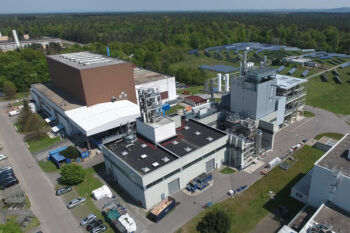Workshop on “Thermochemical technologies for feedstock recycling of waste”
 Thermochemical conversion technologies can provide a significant contribution to Circular Economy (CE). Although transformation of today‘s mainly linear economy towards CE is one of the major sustainability approaches, we have seen little long-term implementation of waste gasification, waste pyrolysis, or similar processes for feedstock recycling, so far.
Thermochemical conversion technologies can provide a significant contribution to Circular Economy (CE). Although transformation of today‘s mainly linear economy towards CE is one of the major sustainability approaches, we have seen little long-term implementation of waste gasification, waste pyrolysis, or similar processes for feedstock recycling, so far.
The increasing focus on CE creates opportunities to promote technology implementation based on previous and ongoing activities and lessons learned.
Bulk waste, typically being collected heterogeneously, can be thermally recycled in waste incinerators. Material recycling that has been implemented for some waste fractions requires extensive pretreatment and is very costly.
Feedstock recycling by thermochemical conversion in contrary deals with bulky waste, mixtures of organic and inorganic content, and degraded end-of-life products in such a way that the overall recycling rate is maximized. These technologies are scalable, can handle difficult feedstocks and produce specified clean intermediates such as synthesis gas or synthetic crude that can be upgraded to chemicals or fuels in existing petro-chemical value chains.
On December 5th, 2017 Karlsruhe Institute of Technology (KIT) hosted a Task 36 workshop to share and promote research and development as well as operational findings oriented to the feedstock recycling of waste via thermochemical conversion.
The workshop program was as follows:
- Feedstock recycling of waste – an introduction to technological challenges
Dieter Stapf, KIT, - Waste gasification overview: two-stage incineration and “true” gasification
Lars Waldheim, Waldheim Consulting, - Entrained flow gasification for low rank fuels
Thomas Kolb, KIT, - The Ecoloop process – Gasification of low rank fuels in the moving limestone bed
Roland Moeller, Ecoloop GmbH, - Gasification of municipal solid waste and tire pyrolysis as alternative solutions for commercial scale treatment of waste streams
Ingo Zorbach, Steinmüller-Babcock Environment GmbH.
The purpose of the common discussion during this workshop was to put a technology oriented view on thermo-chemical conversion of waste as enabler of the future carbon cycle, the de-fossilization of industry and the recycling of mineral construction materials.
Afterwards, the workshop participants visited the bioliq® pilot plant at KIT, a fully operational biomass to liquids project and research platform that demonstrates production of synthetic transportation fuel from low quality non-food biomass feedstock in the ton-scale.
Presentations from the workshop can be found here.
Text: Prof. Dr.-Ing. Dieter Stapf


